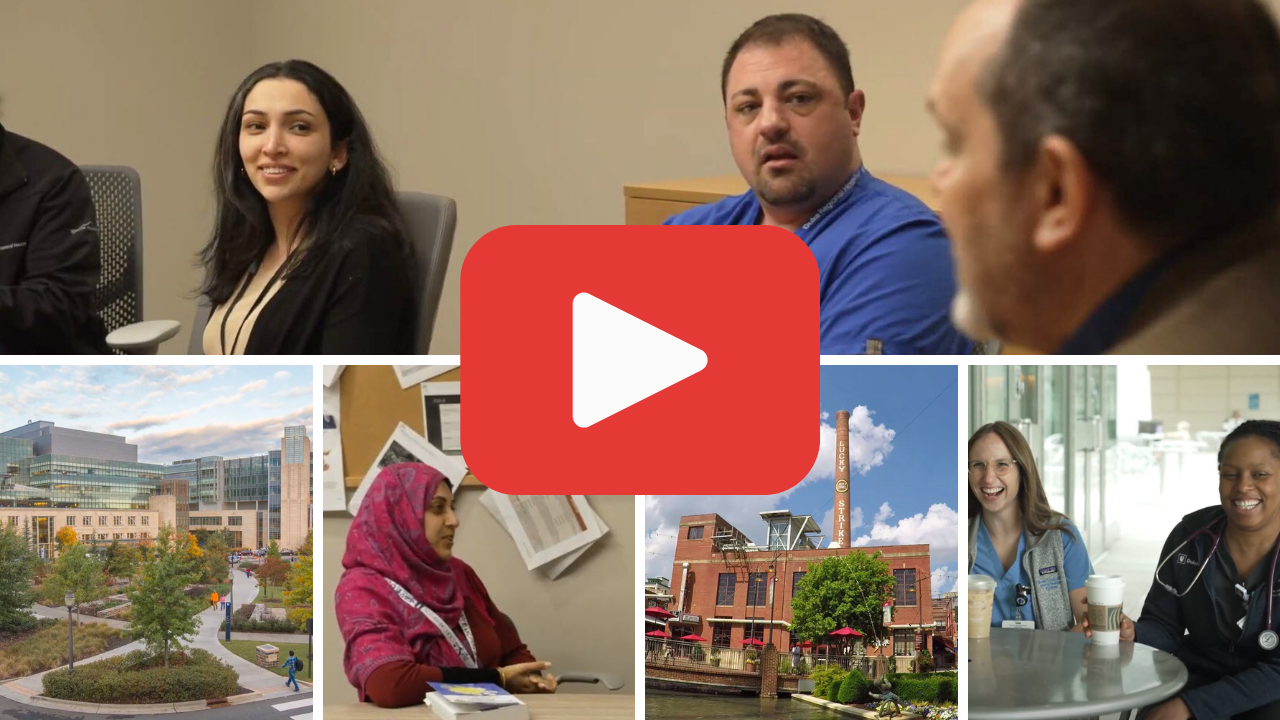
The Duke Psychiatry Residency Program, led by Julie Penzner, MD, is a part of the Duke University Health System, a nationally ranked academic medical center and one of the most sophisticated centers in the world for medical education, patient care, and research.
Residents receive broad-based training with an emphasis on the biopsychosocial model of mental illness.
Why Duke Psychiatry & Behavioral Sciences?
Duke offers psychiatry residents a clinically rigorous, balanced, holistic education, integrating theoretical and scientific understandings of psychiatry, with strengths in both biological psychiatry and psychotherapy (and everything in between!).
Residents provide care to an incredibly diverse patient population and work at a wide array of clinical sites. Residents’ education is supplemented by a robust didactic curriculum taught by leaders in the field.
Our residency is diverse, tight-knit, and supportive. We view strong mentorship, exceptional competence in psychiatry, and resident wellness as essential parts of the residency training experience.
Why Choose Duke?
State-of-the Art Behavioral Health Center
In April 2021 we were thrilled to open the doors to our newly constructed Duke Behavioral Health North Durham at Duke Regional Hospital. This state-of-the-art facility includes a 42-bed inpatient unit, an 18-bed psychiatric emergency department, and a large neurotherapeutics suite and outpatient clinic. The building is spacious, thoughtfully designed, and flooded with natural light.
Hallmarks of the psychiatric inpatient and emergency department include all private patient rooms, access to outdoor courtyards for patients, and ample physician workspaces. Residents rotate at this site for several months over the course of training during their Duke inpatient, emergency psychiatry, and outpatient clinic experiences.
Outstanding Clinical Training
The hallmark of the Duke Psychiatry Residency Program is that we provide residents with outstanding clinical training. With residents completing core clinical rotations at Duke, the Durham VA Medical Center, and Central Regional Hospital (a state hospital), residents work with and learn from an incredibly diverse patient population and a wide array of experienced and dedicated teaching attendings.
Residents receive robust psychotherapy training, including through their participation during PGY3 in the Duke Family Studies Program, where expert family and couples therapists provide live supervision and feedback during therapy sessions. Residents also receive outstanding individual psychotherapy training in supportive therapy, psychodynamic psychotherapy, and cognitive behavioral therapy. Beyond this, residents can also participate in a range of psychotherapy electives, such as acceptance and commitment therapy, and dialectical behavioral therapy.
Emphasis on Culture & Belonging
At Duke, we are proud to have a psychiatry residency program with trainees from a broad range of backgrounds and with widely varied experiences. Likewise, our patient populations at Duke and other clinical settings in the Triangle area reflect the diversity of our local community. Learn more about our emphasis on culture and belonging.
Focus on Resident Wellness
Resident wellness is a huge priority in the Duke Psychiatry Residency. We approach this from multiple directions, including community building, social activities, efforts to prevent burnout and working to increase access to mental health treatment. We aim to provide exceptional clinical training in a setting in which we take pride in being ourselves and supporting one another. Learn more about our residency community.
Opportunities to Pursue Specialized Interests
At Duke, we offer four specialized tracks for residents with specific interests in any of these areas:
- Physician Scientist Track
- Clinician Educator Track
- Psychotherapy Track
- Public and Community Psychiatry Track
In addition, residents at Duke have the opportunity to take advantage of an incredible array of elective opportunities. These include numerous electives in child and adolescent psychiatry (Child Outpatient Clinic, Duke Center for Autism and Brain Development, College Student Mental Health, ADHD Clinic, Child Med-Psych Clinic, Child Consult-Liaison), and other psychiatry subspecialties (forensics, geriatrics, sleep, consultation-liaison, addictions, and community).
Our ECT elective is one of our most popular electives, with more than half of our residents opting to participate. Some other popular electives include the Gender Care Clinic, neuropsychiatry, hospice and palliative care, eating disorders, perinatal psychiatry, psycho-oncology and a six-month global mental health elective in New Zealand.

“I am incredibly grateful to call Duke Psychiatry Residency my home away from home. The support from my co-residents and our phenomenal leadership team has created an environment where I have felt safe to grow, learn, and challenge myself. I am confident that I will leave this program as a psychiatrist who is not only clinically competent but also a compassionate physician prepared to serve patients from all walks of life. I couldn't imagine a better place to have completed my residency.”
— Barra Madden, MD, PGY4 Psychiatry Resident
